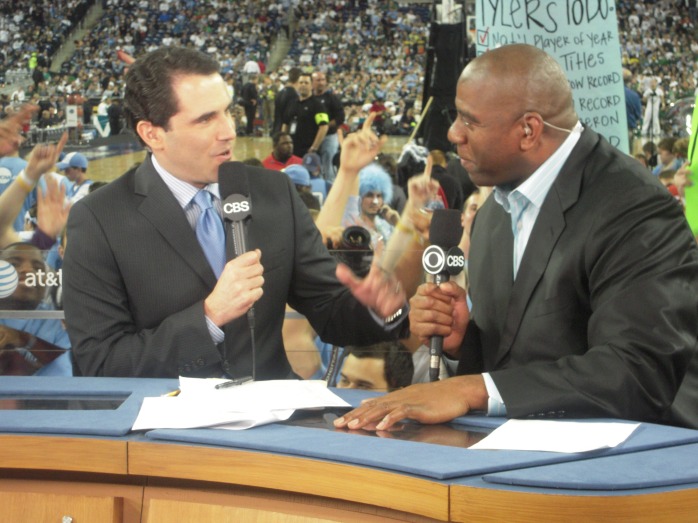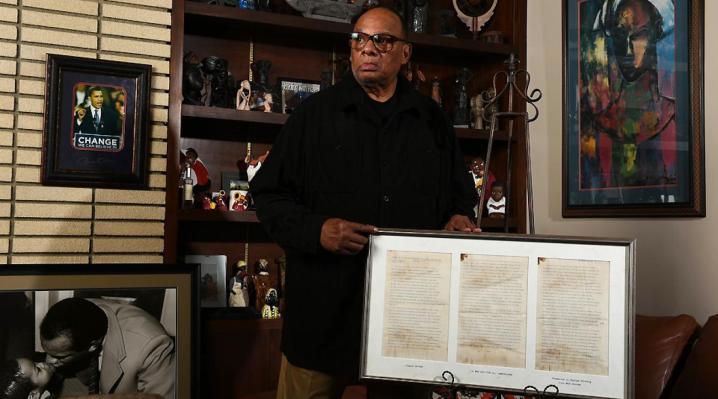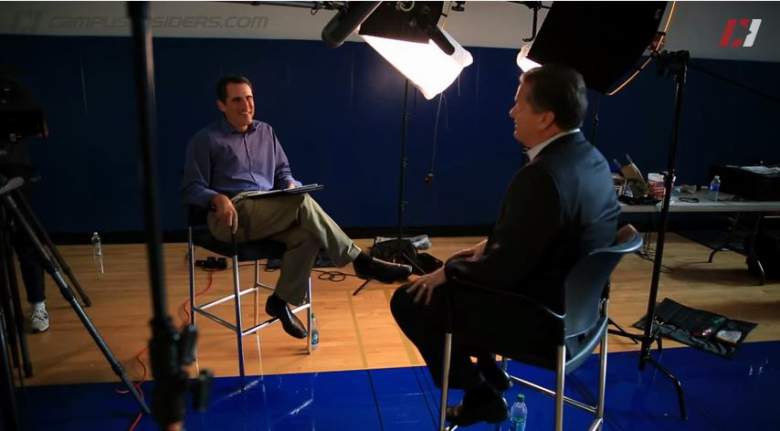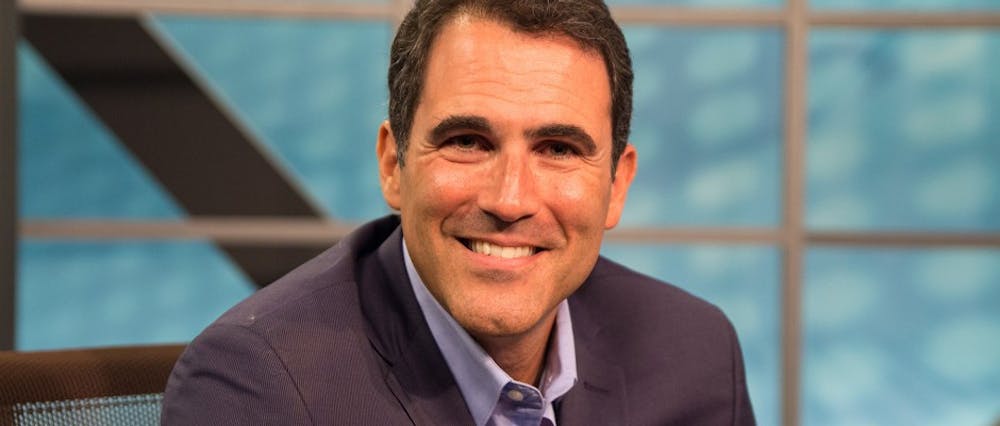When I was growing up, I read the sports page of the newspaper every morning. It’s really a pretty ridiculous mental image in 2016, a young boy sitting and reading while eating his cereal before school.
It was a time in the not-too-distant past when my mom could actually get away with a morning routine that didn’t include any screens. The only peep she heard out of me was when I would find an especially interesting nugget or funny quip I felt she just had to be informed about.
If the local newspaper was the gateway drug into sports media, then Sports Illustrated was the full-blown addiction. The SI-themed duffel bag in my closet given to 10-year subscribers proves it. Every week I read cover to cover. My sports gurus were Rick Reilly, Lee Jenkins, and among others, Seth Davis.

Yeah, sign me up for whatever job involves chatting with Magic Johnson.
To this day, I’m not quite sure if I’d consider Davis a celebrity. Is he famous? I guess so. He has more than 273,000 Twitter followers, which in 2017, is as good of an indicator as any to a person’s level of fame.
I doubt Davis gets recognized at the grocery store, or stopped for autographs at the coffee shop. But, I am a different story. As the most obsessive college basketball fan I’ve ever met, I revered analysts like him.
When I, perhaps inevitably, decided sports media was the career path I wanted for myself, there were few jobs I was more envious of than that of Davis — television star, New York Times bestselling author, contributor for Sports Illustrated.
So imagine my surprise when I was approached by Chris Taylor, the director of my academic program, with the opportunity to do some work for THE Seth Davis early in 2014.
Through a preexisting relationship, Davis was requesting one of Taylor’s Sports Link students to transcribe an interview for a Sports Illustrated story he was writing on deadline.
In my short life, one thing I’ve learned is that monumental moments pass by just as quickly as insignificant ones. A light does not flash in the sky signaling when the important moments come. But it’s those select moments, so few in number, which end up defining your story.
However when you’re a 19-year-old college freshman who just received a personal email from someone you look up to as much as I looked up to Seth Davis, it’s about as close to that sign in the sky as it gets.

The interview I transcribed was with George Raveling, who was handed the original “I Have a Dream” speech by Martin Luther King Jr.
Davis was sending me an interview that spanned more than three hours, needing it back in a week. I had never transcribed anything in my life, but I was determined to leave the best first impression I could.
The transcription took around 12 hours for me to complete. I got it back to him in 24 hours. His story got out on time and I had made my impression.
I’ve now been interning sporadically for nearly three years with Davis.
It has never been about the work for me, which has included an awful lot of transcribing for a book project he has in the works as well as social media promotion for his “Seth Davis Show” on Campus Insiders and recently launched podcast.
No, I was far more interested in observing the man who had made it. How had he done it?
In general, the way to succeed as a personality on television or the internet is pretty simple. You have to have what I call “the juice.” Essentially it all comes down to being able to move the all-important needle, to attract views, clicks and engagements by whatever means possible.
Quite honestly, the fact Davis has “made it” doesn’t make a lot of sense at surface level. He doesn’t especially fit into any criteria you would use if you were describing “the juice” to someone who had never heard of him.
He doesn’t benefit from being a former professional or collegiate athlete, the primary prerequisite to being considered an “expert” on television. He has no built-in rapport with the audience based on past athletic achievements, or a hulking physique underneath his suit that demands respect in any situation.
So the next assumption might be he’s a member of this new generation of analytics-crazed techies, reaching analysis by way of crunching the numbers in some irrefutable way. But that couldn’t be farther from the “old soul” brand Davis has cultivated. His scrutiny remains largely old school: qualitative judgments based on observation and reporting.
Nor is he the type of performer that is going to dazzle you on screen. He isn’t afraid to crack a joke on the air, but his stand up comedy career crashed and burned — by his own admission — in the 1990s. His humor is more understated, and not nearly incendiary enough to cause a stir.
But Davis has tapped into something even deeper, a trait that is perhaps more valuable than any other in the current media landscape — authenticity.
In 2017, the world is anything but authentic. In a culture where everyone seems to be either trying to manipulate others for personal gain, or just believing that is the case everywhere they look, comes a deep appreciation for those who are genuine.
This is particularly true in the sports media climate.
With the need for 24 hours of content per day, programming on every channel is a façade. Overly-enthusiastic faces and flashing graphics beg the audience not to turn the channel or close the browser under the guise of hot takes and recycled insights.
In a recent profile on TheRinger.com, Colin Cowherd admitted as much.
“There’s no money in right. All the money’s in interesting,” Cowherd explained. “If I’m wrong…who cares? I’m in the interesting business.”
Such is the philosophy across almost all sports media. It is here where Davis separates himself.

Long form interviews are Davis’s bread and butter. “The Seth Davis Show” on Campus Insiders has featured a laundry list of great guests, including John Calipari.
From the persona of a kind old neighbor sitting in a rocking chair on the front porch, Davis brings intelligent yet unpretentious sports commentary. He would like nothing more than to transform completely into the protagonist of his favorite book, Atticus Finch of To Kill a Mockingbird.
To watch any of his countless long form interviews on his Campus Insiders show or listen to his podcast is to understand this positioning. Rarely does he produce content ready-made for viral distribution. It’s simply not his style.
He doesn’t participate in “gotcha journalism,” provoke angry rants from guests or ask embarrassing questions. The sessions are truly a master class in empathy, to the point of bordering on therapy. Davis prefers to focus on upbringing, family and journey, searching to understand the person outside of their respective sport.
On Twitter, his social media platform of choice, he once again makes no attempt to hide who he is and what he believes. His college basketball opinions are, for example, in favor of less timeouts and more upperclassmen, and he’s willing to defend his views fervently to any skeptics.
He even started sharing his fairly strong political views on the platform over the summer, a move that has been a long time coming considering Davis is the son of a former special counsel to the Clinton administration.
In either case, people seem to appreciate the fact Davis doesn’t hide which side he’s on. Unlike many media members and outlets who merely pretend to maintain objectivity and refrain from bias, Davis doesn’t try to hide the side he is starting from, yet remains willing to hear an intelligent counter argument.
He even boasts his political exchanges on Twitter have been more civil than those centered around sports.
Eron Harris apparently wants be first team all disappointment. If he doesn't have a big year Michigan State gonna struggle.
— Seth Davis (@SethDavisHoops) November 16, 2016
Trump's demeanor in 60 Minutes interview is encouraging. But it's far more counterbalanced by his decision to appoint Steve Bannon.
— Seth Davis (@SethDavisHoops) November 14, 2016
On the few occasions I’ve had to spend time with Davis in person, it becomes obvious immediately the brand of authenticity is, in fact, genuine.
It is impossible to be intimidated by him when met with a smile and a self-deprecating joke, and despite the constant pull of obligations pleading for his time, he will engage you with an intense eye contact and focus that would come off as aggressive if it wasn’t accompanied by an enticing nod and follow-up questions.
Whether it be inviting me for a drink with his old high school English teacher after a sports banquet he hosted in my hometown, or to watch the NBA draft with the NBA TV crew in the green room of the Turner Studios in Atlanta, he always made me and everyone else around him feel welcome.
You can see that quality carrying over into his work. Davis will always respect the wishes of his sources by keeping certain information off the record, valuing the relationship over a few extra retweets and headlines.
That’s not to say that he takes it easy on people, and in fact seeks out stories and interview subjects with some element of conflict or controversy. He makes sure to ask all relevant pressing questions — unafraid to venture into uncomfortable subjects, but with a very clear “just doing my job” attitude devoid of maliciousness.
All of which is not meant to portray a very idealistic view of the world, where Seth Davis is rewarded simply for being a good dude. He’s a hard worker and he’s excellent at his job. He’s got “the juice.”
But most importantly, he’s unabashedly himself.





